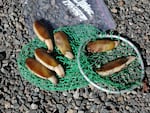
A 2017 file photo of razor clams. Oregon has reopened razor clam harvesting from the Yachats River up to the Washington state border, but other shellfish harvesting remains restricted.
Courtesy of NOAA
Limited shellfish harvesting is allowed again on parts of the Oregon Coast — but some species and some coastal areas are still off-limits.
The Oregon Department of Agriculture announced Friday that it’s safe to harvest razor clams along the coast from the Yachats River up to the Washington state border, but it’s still too risky to harvest razor clams south of Yachats down to the California border.
Bay clamming is still closed across the entire Oregon coast, and so is mussel harvesting.
Those species still have high levels of the marine biotoxin that causes paralytic shellfish poisoning — which can cause stomach problems, numbness and, in severe cases, paralysis.
Paralytic shellfish poisoning is caused by algae that thrive in warmer waters, and may become more common off the Oregon coast as the climate warms, according to state officials.
Crab harvesting remains open along the entire coast. The Tillamook Bay and Netarts commercial oyster fisheries are open, but the Umpqua River/Winchester Bay commercial oyster fishery is closed.
The Oregon Department of Agriculture says people should always check its biotoxin closures website or call the shellfish safety hotline before heading out to harvest shellfish. The hotline number is 800-448-2474.
Washington state, which has also enacted shellfish harvesting restrictions, reopened the Willapa Bay to commercial shellfish harvesting on Wednesday, but is requiring each batch of commercially harvested shellfish to be tested for the PSP toxin.
Recreational shellfish closures remain in place for all Washington coastal beaches. The state’s fish & wildlife agency posts updates to a shellfish safety map, and via its biotoxin and red tide hotline: 800-562-5632.
